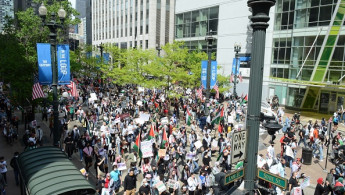Judge denies appeal for longer pro-Palestinian protest route at Chicago's Democratic National Convention
With a federal judge's denial on Tuesday to activists for a longer protest route at the Democratic National Convention (DNC), community organisers say they will continue advocating for their preferred route with less than a week to go until the start of the DNC.
"The court case is not the be-all-end-all. We're going to appeal and will continue pressuring the city to say that this is ridiculous, Muhammad Sankari, a Chicago-based member of the US Palestinian Community Network, told The New Arab, following the judge's latest decision on Tuesday.
Though demonstrations are common at conventions, the march on the DNC is expected to be unusually large given the response to US President Joe Biden's support of Israel's war on Gaza, which has killed more than 40,000 Palestinians. Multiple human rights groups have described Israeli's actions in Gaza as genocide.
"Tens of thousands of people will be crammed into residential streets. That's not what anyone wants," he said.
In the lead-up to the convention, multiple groups of activists, the Alliance Against Racist and Political Repression, the Anti-War Committee, Students for a Democratic Society at UIC, and the US Palestinian Community Network, have been advocating for a longer protest route of 2.3 miles as opposed to what the city has been offering of 1.1 miles, and to be within sight and sound of the convention to get their message out.
The city recently granted them the closer distance at Union Park rather than their original offer of Grant Park to start the rally, giving them a prominent position near the convention, where they plan to gather on the opening day on Monday.
"The judge essentially said that the city had met the legal burden with the route," said Sankari, noting that the city's legal obligation is narrow.
In addition to continuing to push for a longer route, organisers have also sought a permit for a sound system, which they are still waiting on months after their request.
Throughout the appeals process, activists say the city of Chicago has granted them only the basics of what is required under the law in line with their first amendment rights.
"Suppression is not going to get the outcome they hope for. We're not going to shut up," said Sankari. "We're going to show that the tens of thousands of people will be out on the street representing the vast majority of the country that are disgusted with this genocide."





 Follow the Middle East's top stories in English at The New Arab on Google News
Follow the Middle East's top stories in English at The New Arab on Google News


